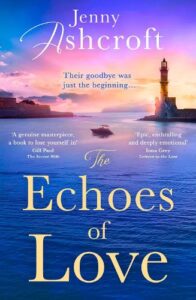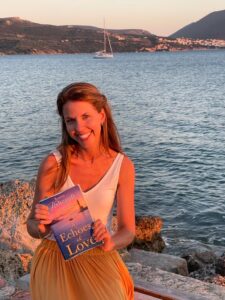Jane Cable reviews this fabulous historical romance
Where do I begin with this incredible book? With the sweeping love story at its gripping heart, or the impeccable historical research, or the phenomenal sense of place and time that had me living and breathing Crete in 1936 and during the Second World War? Or shall I just cut to the chase and tell you this will most likely be my book of the year.
 In 1936, eighteen year old Eleni Adams returns from England to Crete to spend the summer with her Greek grandfather, something she has done every year since her mother died when she was a baby. But this summer is different; this summer she falls in love with Otto, the German boy staying in the villa next door, and I was as captivated by the breathlessness of young love, the intensity of feeling, as I was by the setting that made me feel as though I was really sitting above that cove near sun-drenched Chania.
In 1936, eighteen year old Eleni Adams returns from England to Crete to spend the summer with her Greek grandfather, something she has done every year since her mother died when she was a baby. But this summer is different; this summer she falls in love with Otto, the German boy staying in the villa next door, and I was as captivated by the breathlessness of young love, the intensity of feeling, as I was by the setting that made me feel as though I was really sitting above that cove near sun-drenched Chania.
But we all know our history, and in 1941 Crete was captured by the Germans. By that time Eleni is an SOE agent based on the island, and rather than leave she goes underground in the bombed out ruins of Chania to help to support the resistance. Meanwhile Otto is one of the first wave of fighters to be parachuted in; a reluctant Nazi, a man who stands against cruelty and reprisals, and of course the lovers’ paths cross once again.
Also running through the book is the transcript of an interview from 1974, given by the man who, it becomes apparent, betrayed Eleni. A man who knew her well. A man who she trusted.
This book transported me absolutely, haunted my dreams, tore me apart, and put me back together again. It’s an absolute triumph, so I was delighted when Jenny Ashcroft agreed to tell me how, and why, she came up with the idea of the interview transcript.
 JA: First of all, thank you so much for this wonderful review. I’m absolutely thrilled you enjoyed it! As for the transcripts, the idea for those actually came before the central idea for the book. Often when I’m trying to come up with something new, I’ll write scenes or bits of dialogue that spring into my mind, and one afternoon I found myself playing around with a prologue written in interview form.
JA: First of all, thank you so much for this wonderful review. I’m absolutely thrilled you enjoyed it! As for the transcripts, the idea for those actually came before the central idea for the book. Often when I’m trying to come up with something new, I’ll write scenes or bits of dialogue that spring into my mind, and one afternoon I found myself playing around with a prologue written in interview form.
I love historical documentaries, and just thought that the dynamic between a researcher and their subject could be a really rich one – especially if that subject is carrying some deep regret, or secret, from their past. So, I wrote a sample for my agent, she really loved it, and when, a couple of weeks later, I went back to her with my synopsis for The Echoes of Love, she was really enthusiastic about that too, but asked, ‘Is there any way you can get that transcript idea in?’ I thought there was, decided that they could work as being from a fictional BBC documentary commemorating the liberation of Greece, and that’s how the transcripts came to be woven through the text of Eleni and Otto’s story.
All very iterative, and I wish I could say that I knew from the start precisely what I was doing, but I never seem to know that with any book! For me, it really is the case that it’s only when I start to write that I come to realise where I want to go. But I’m so glad I did weave those transcripts in. They really did become such a core part of the story.



 A 77 year old Greek pensioner took his own life outside the Greek parliament building on Wednesday morning. Retired pharmacist Dimitris Christoulas shot himself in the head with a handgun. In a suicide note, Christoulas linked his tragic act to the country’s economic crisis. In the note found by his daughter he wrote, ‘I have no other way to react apart from finding a dignified end before I start sifting through garbage for food,’
A 77 year old Greek pensioner took his own life outside the Greek parliament building on Wednesday morning. Retired pharmacist Dimitris Christoulas shot himself in the head with a handgun. In a suicide note, Christoulas linked his tragic act to the country’s economic crisis. In the note found by his daughter he wrote, ‘I have no other way to react apart from finding a dignified end before I start sifting through garbage for food,’